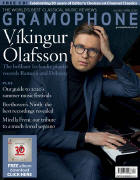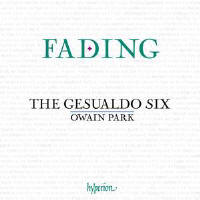Texte paru dans: / Appeared in: |
|
 |
Outil de traduction (Très approximatif) |
|
Reviewer:
Alexandra Coghlan Ingeniously programmed and impeccably delivered, with that undefinable excitement that comes from a group of musicians working absolutely as one, The Gesualdo Six’s ‘Fading’ is startlingly, urgently excellent. If their first album (‘English Motets’, 4/18) pricked up the ears and their second (‘Christmas’, 12/19) confirmed their talent, this third recording from the young, all-male vocal ensemble feels like an arrival, showing us exactly what this group is capable of. ‘Fading’ is an album of dusk and dawn, autumn and spring – music from the cusp, caught between light and dark, innocence and experience. What opens with candlelit music for Compline, fading to black, closes outdoors in the stirrings of rebirth and rich new beginnings. The now ubiquitous combination of Renaissance and contemporary works is carefully handled, with plenty of new and unfamiliar names – Sarah Rimkus, Gerda Blok-Wilson, Jonathan Seers – in the mix as well as unexpected choices from Gesualdo and Marenzio alongside classics by Tallis, Lobo and Gombert. Music director Owain Park has built his sequence thoughtfully, and much of the joy here comes from the conversations between works: the melting resolution from Joanna Marsh’s ‘Fading’ into the sober certainty of Byrd’s ‘My sweet little baby’ (the lullaby’s unusually low key giving it a caressing warmth and pillowy depth thanks to the group’s fine basses), the fragile legato lines of Hildegard of Bingen’s O Ecclesia shattering into the echoing melodic fragments that open Rimkus’s My heart is like a singing bird, the way Tormis’s aphoristic little Estonian Lullabies energise and reset the ear before the longer polyphonic pieces. The quality of the singing – the blend and bass-anchored balance, the rounded, unforced tone, the control from solo voices – is exhilarating. But what’s even more exciting is what we don’t hear. These aren’t performances that call attention to themselves. The polyphonic instinct to listen and pass focus between the voices runs right through the repertoire, which breathes with instinctive momentum, natural rather than enforced expression, finding spaces within the music rather than bending it into statements. If you think you don’t need another account of Gombert’s mighty Media vita or Lobo’s Versa est in luctum, have heard enough performances of Tallis’s Te lucis ante terminum or simply don’t have space for yet another young English choral group on your shelves, then think again. The Gesualdo Six are the real deal. Far from fading, they’re just coming into focus. |
|




